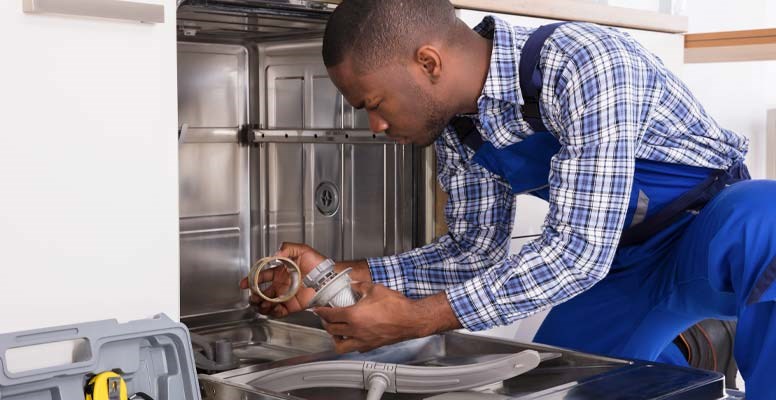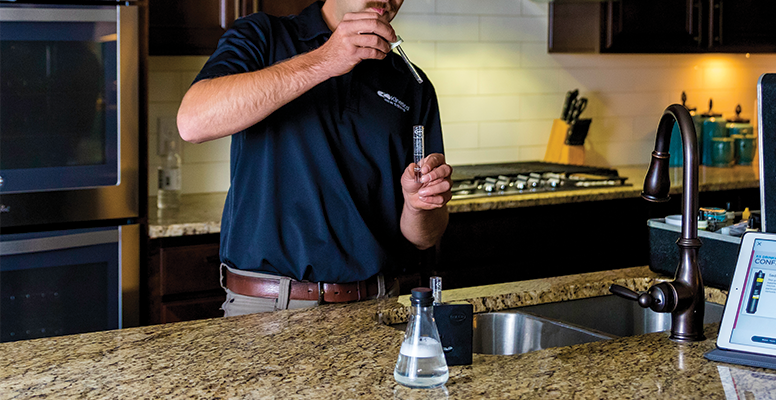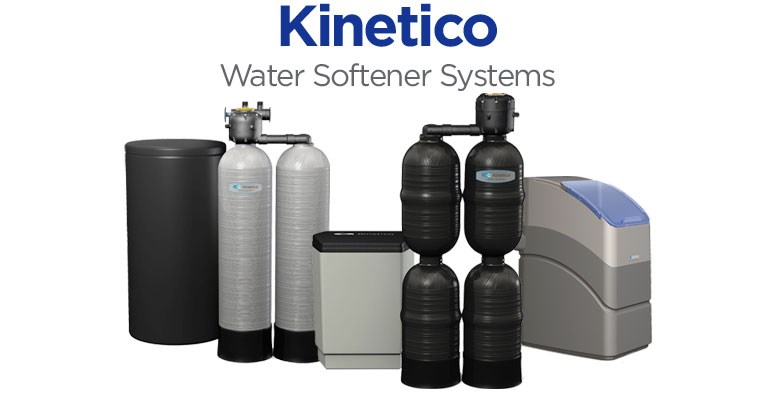What Is Hardness In Water?
Understand what hardness is and how to test for hard water.
Water Hardness
Water can be hard or soft, but do you know the difference between the two? If given a choice, most people would prefer soft water since water with hardness can cause problems around your home and for you personally. So what is hardness and what can you do to address hard water?
What causes hardness, and what does it do?
Pure water is composed of hydrogen and oxygen and will contain nothing else - no taste, no smell, no color. Unfortunately, water does not stay in a pure state for long. As the universal solvent, water will pick up some of whatever it contacts, making the water less pure. So when water travels through soil and rock, it dissolves and picks up a variety of minerals. Quite often calcium and magnesium, the hardness minerals, find their way water into water, causing hardness in water.
Schedule A Free Water Test Today To
Determine If Your Water Is Hard
Contact A Kinetico Water Expert Today
Fill out your information below and we’ll have one of our authorized, independent Kinetico dealers contact you to schedule your free in-home water test.
Consuming hard water is not harmful to your health. Calcium and magnesium are essential minerals and important for overall health; however, studies show food is a better source for nutrients rather than water. Many people don’t like the taste of water containing a high level of hardness minerals. The real issue with hardness in water are the problems it can cause for you and your home.
Signs of hardness in your water
When your home has hard water, there are usually telltale signs of hardness. Are you suffering from any of these hardness problems?

- Your skin is dry or itchy, or you feel sticky after bathing.
- Your hair is dull, unmanageable, tacky or brittle.
- You see white spots on your dishes, glasses and silverware once they dry.
- You notice a white film on shower doors or other glass surfaces.
- You spend a lot of time cleaning high water areas like sinks, tubs and toilets.
- There’s a chalky white buildup on fixtures or other places that use water.
- Your clothes feel stiff after washing, especially if hung or laid flat to dry.
- Your water-using appliance don't perform as well as when they were new.
- You have to use a lot of soap, shampoo or detergent to get a good lather.
- You frequently have to repair or replace water-using appliances.
How is hardness measured?
Hardness is generally measured in grains per gallon (gpg). Although the hardness scale only lists water up to 10+ grains per gallon of hardness, there are homes that have water in excess of 100 grains of hardness. Although there are homes with naturally soft water, many homes need to mechanically soften water to achieve a hardness level of less than one gpg. Most water is either slightly or moderately hard, hard or very hard. Any amount of hardness in a water supply, even a small amount, can cause problems.
Water Hardness Scale
| Hardness Level | Grains Per Gallon (gpg) Hard |
| Soft | Less than 1 gpg |
| Slightly Hard | 1 - 3.5 gpg |
| Moderately Hard | 3.5 - 7.0 gpg |
| Hard | 7.0 - 10 gpg |
| Very Hard | 10 gpg or more |
To help you better visualize what we mean by grains per gallon, picture an aspirin bottle filled with white aspirin tablets. Each tablet represents one grain. For each grain per gallon of hardness in your water, take out one aspirin tablet and set it on your table. The pile of aspirin roughly represents how much dissolved rock is in every gallon of your water.
Testing Water Hardness
We are often asked how water hardness is determined. Most often, two hardness tests are performed: the titration test and the soap test. Other demonstrations can be used too to show water hardness.
Titration Test
Both in a lab and in the field, the titration test is the most common water hardness test. The titration test is performed by adding chemicals to the water that give it color, then adding another chemical, drop by drop, until the color changes. The number of drops required to change the color is the number of grains per gallon of hardness in the water. If it takes seven drops of the chemical to change the water’s color the water is seven gpg hard. The titration test is a very exact and accurate way to figure out the number of grains per gallon of hardness in water.

Soap Test
A soap test demonstrates the difference between hard water and soft water in a dramatic way. A specific, pure liquid soap is used, that has the same concentration in every bottle, all the time. This particular soap is made so that one drop creates suds in a flask of water with less than one grain of hardness per gallon. If the water needs two drops of soap, the water has two grains of hardness, three drops for three grains, and so on. You can purchase a test kit to try this yourself. It’s also a fun demonstration for school science projects.
Schedule a Free Water Test to See How Hard Your Water Is
Hardness Demonstrations
Wash Cloth Demonstration
The washcloth demonstration is another way to show if your water is hard. Using a jar filled with soft water, insert a freshly laundered washcloth, seal the jar tightly and shake it vigorously. Since hard water doesn’t rinse soaps and detergents away completely, a washcloth washed in hard water will likely contain leftover detergent, causing the soft water in the jar to turn sudsy. If the water in the jar remains clear, your water is soft.
To help you better visualize what we mean by grains per gallon, picture an aspirin bottle filled with white aspirin tablets. Each tablet represents one grain. For each grain per gallon of hardness in your water, take out one aspirin tablet and set it on your table.
How to treat water hardness
Treating hardness in water is usually done with a water softener to reduce the calcium and magnesium content. Before a water softener is installed, it is important to determine how hard the water is. Although there are simple, do-it-yourself test kits, results are usually not as accurate or precise as having a water test done by a water professional. Often, water contains more than hardness, and a professional can help determine what else may be in your water.

Schedule a water test with your local Kinetico water expert. They will test your water for hardness and other contaminants. Once they have your test results, they can create a water treatment plan for you.
Kinetico offers a wide range of water softeners, water filters and drinking water systems. Regardless of your water problems, we have a water treatment solution for you.
Contact An Authorized Kinetico Dealer To

